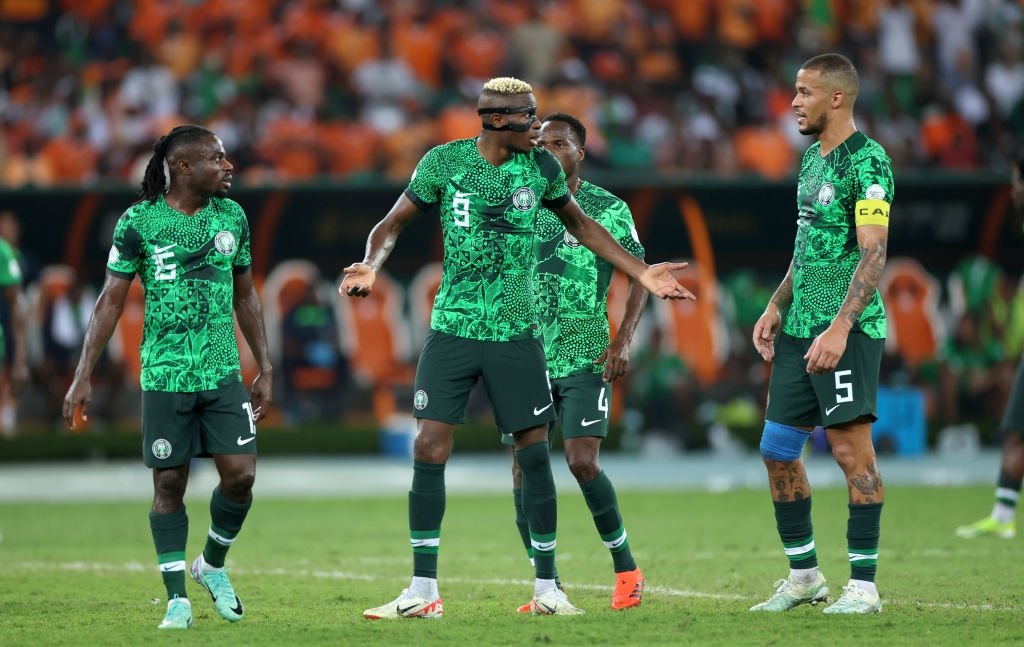Who Started Football To Nigeria? History Behind Soccer Within Nigeria
페이지 정보

본문
A tremendous 67% of Nigerians enjoy Football, which shows how much the sport influences Nigerian culture. Football's journey in Nigeria began over 100 years back, shaping the country's sporting landscape.
Football in Nigeria go back to the early 1900s. British colonisers brought the sport to the country in 1904. The very first recorded football match happened that exact same year, kicking off Nigeria's abundant footballing history.
By 1950, Football had actually ended up being Nigeria's nationwide game. Its quick rise resulted in lots of clubs and associations forming in the early 1900s. This growth improved Nigerian pride and helped influence political liberty motions.

Nigeria's football tradition now reaches beyond its borders. For many years, the nation has actually produced first-rate talent, and Nigerian youth groups have won the FIFA U-17 World Cup five times.
The Super Eagles, Nigeria's national team, are a force in African Football. They typically get approved for significant competitions and make their mark internationally.
The British Colonial Introduction of Football to Nigeria
Football got here in Nigeria during the British colonial period. It quickly caught the hearts of residents, marking the start of an abundant footballing tradition in the nation.
The First Football Match in 1904
The first football match in Nigeria occurred in June 1904. It was in between Hope Waddell Training Institution and the team of HMS Thistle. The Nigerian team won 3-2, stimulating a nationwide enthusiasm for the sport.
Hope Waddell Training Institution vs HMS Thistle
I hope the Waddell Training Institution in Calabar played a key function in early Nigerian Football. Their victory over HMS Thistle's team revealed the talent of Nigerian gamers. This match set the stage for Football's growth in the nation.
Early Football Club Formation (1906-1932)
After the 1904 match, Football's popularity soared. From 1906 onwards, early football clubs started forming, and this grassroots movement spread the sport throughout Nigeria.
The Lagos District Amateur Football Association (LDAFA) was developed in 1932. The LDAFA marked the start of organised Football in Nigeria and led the way for the sport's future success nationally and internationally.

Who Introduced Football in Nigeria
Football got here in Nigeria in the early 20th century. British colonisers brought this beloved sport to the West African nation. It rapidly ended up being a passion that shaped Nigeria's sporting landscape for generations.
Role of British Colonisers
British colonisers played an essential role in Nigeria's football history. The first taped match happened in June 1904. Hope Waddell Training Institution dealt with the team of HMS Thistle.
The Nigerian team won 3-2. This success marked the beginning of a rich football legacy in the country.
Formation of First Football Association
The Lagos District Amateur Football Association (LDAFA) was developed in 1932. It laid the groundwork for organised Football in Nigeria, which led the way for the Nigerian Football Association (NFA).
The NFA was founded in 1945. It became the national governing body for Football and supervise its development throughout the nation.
Development of Local Football Culture
Football quickly took root in Nigeria, ending up being the national sport by 1946. Its ease of access and easy rules assisted it spread quickly. Regional communities accepted the video game, forming their groups.
This grassroots enthusiasm laid the structure for Nigeria's future success. The country's passion for Football grew, causing achievements on the worldwide phase.
"Football became more than simply a sport; it evolved into a crucial Nigerian culture and identity aspect."
The British colonisers' introduction of Football stimulated a sporting revolution in Nigeria. Football's journey mirrored the nation's development from the first match in 1904 to the development of the NFA in 1945.
Today, Football remains an important part of Nigerian life. It's a testament to the sport's long-lasting appeal and cultural significance in the country.

The Rise of Nigerian Football Administration
The Nigerian Football Association (NFA) was developed in 1945. It played an essential role in shaping Nigerian Football. In 1949, the NFA formed Nigeria's first nationwide football team.
In 1959, Nigeria joined the Confederation of African Football (CAF), which allowed it to participate in continental tournaments. Nigeria likewise became a FIFA member in 1960, joining the international football community.
The NFA, later on relabelled the Nigeria Football Federation (NFF), organised national competitions. They created the Nigerian Premier League and the Federation Cup, which ended up being the highlights of domestic Football.
Football associations throughout Nigeria prospered under the NFF's assistance. They nurtured skill and promoted grassroots advancement. Professional Football started in 1990 with sixteen club sides participating.
"Our objective is to revive football development at the nationwide level and repackage the league in line with worldwide best practices," specifies the Nigeria National League.
The Premier League was carried out in 2003. This move intended to enhance domestic football standards and draw in more viewers and sponsors to national competitions.
Nnamdi Azikiwe's Impact on Nigerian Football
Nnamdi Azikiwe, born in 1904 in Zungeru, Northern Nigeria, left an indelible mark on Nigerian Football. His influence formed the country's sporting landscape. Azikiwe's passion for sports stemmed from his diverse experiences and education abroad.
Establishment of Zik's Athletic Club
In 1938, Azikiwe founded Zik's Athletic Club (ZAC) in Lagos. This club became a symbol of African self-determination. ZAC played a vital role in developing Nigerian Football.
It offered a platform for young athletes to showcase their skills. The club promoted local skill and cultivated a sense of national pride.
The West African Pilot's Influence
Azikiwe's newspaper, the West African Pilot, played a substantial role in popularising Football throughout Nigeria. It extensively covered local matches, team news, and gamer profiles. This limelights assisted grow the sport's fan base.
Football as a Tool for Independence
Azikiwe saw Football's prospective as a unifying force in the self-reliance motion. He used the sport to break down ethnic barriers, and Football became a symbol of Nigerian unity through his advocacy.
Azikiwe's efforts linked Football to nationalism, contributing substantially to the sport's growth and shaping its role in modern Nigeria.
"Football is not simply a video game; it's an effective nationwide unity and identity tool."
Nigeria's Journey to International Football Recognition
Nigeria's football journey took a significant leap forward in 1960. The country got FIFA membership, marking its entry into international Football. This milestone accompanied Nigeria's self-reliance from British rule.
FIFA Membership and First International Match
Nigeria's very first international match occurred on 8 October 1949. They dealt with Sierra Leone and won 2-0 in a historical encounter. This victory triggered enthusiasm for Football across the nation.
Early Continental Competitions
Nigeria debuted in the Africa Cup of Nations in 1963. The tournament, hosted by Ghana, saw Nigeria dealing with hard challengers. These experiences proved valuable for the team's growth.
Nigeria's determination settled in 1973. They clinched gold at the All-Africa Games, marking their first major continental success. 1976, they protected bronze at the Africa Cup of Nations in Ethiopia.
Nigeria's football prowess grew in the 1970s. In 1978, they repeated their bronze medal accomplishment in Ghana. 1980, Nigeria hosted and won its first Africa Cup of Nations title.
Advancement of Nigerian Football Governance
Nigerian football governance has actually seen considerable changes and challenges considering that 1945. The Nigeria Football Federation has actually shaped the nation's football landscape, and its journey has actually been complicated and transformative.
From NFA to NFF
The Nigeria Football Association began in 1945. It ended up being the Nigeria Football Federation in 2008. This change aimed to modernise the organisation's structure.
In 2019, a bill was passed to acknowledge the NFF formally. It's still awaiting presidential approval.

Advancement of League Systems
The NFF supervises three primary leagues: the Nigerian Premier League, Amateur League, and Women's League. These competitions form the backbone of nigerian youths Football.
They foster talent and promote the sport nationwide. However, obstacles like postponed seasons and location disagreements persist.
National Team Formation
Nigeria's Super Eagles national team was formed in 1949. They've gotten approved for six FIFA World Cups and won three Africa Cup of Nations titles.
These achievements have actually boosted Nigeria's standing in international Football. The Super Eagles' success has actually put Nigeria on the global football map.
However, Nigerian Football faces continuous obstacles. A research study exposed high levels of corruption in football governance. This impacts agreement awards and player selection.
These issues highlight the need for reform. For the sport to grow, openness in the Nigerian football administration need to enhance.
Conclusion
Nigerian Football's legacy showcases the nation's resilience and passion. It started in 1904 with Hope Waddell Training Institute dealing with HMS Thistle. Since then, Nigeria has ended up being a powerhouse in African Football.
The sport's development shows the country's journey from colonial guideline to self-reliance. It has promoted a sense of national identity and unity. Nigeria's international football acknowledgment is indisputable.
The Super Eagles' gold medal at the 1996 Atlanta Olympics is an emphasize. Their excellent FIFA World Cup efficiencies also stick out. Nigeria has gotten approved for six World Cups.

In 1994, Nigeria attained its greatest FIFA ranking of 5th, solidifying its put on the global phase. Nigerian Football continues to progress with promising potential customers.
Skills like Ahmed Musa and Kelechi Iheanacho shine in top European leagues. This bodes well for the sport's development. The Nigeria Football Federation guides the game's development.
Football's sustaining legacy in Nigeria motivates upcoming generations and promises an amazing future for the sport. The stunning game remains a source of nationwide pride and unity.
FREQUENTLY ASKED QUESTION
Who introduced football to Nigeria?
British colonisers brought Football to Nigeria in the early 1900s. The sport quickly ended up being popular and woven into Nigerian culture.
When was the first football match played in Nigeria?
The first documented football match in Nigeria happened in June 1904. Hope Waddell Training Institution bet the HMS Thistle crew. The Nigerian team won 3-2.
How did Football become Nigeria's national sport?
Football's simple guidelines and accessibility made it popular in Nigeria. By 1950, it was the nationwide video game, motivating pride and freedom motions.
What function did Nnamdi Azikiwe play in Nigerian Football?
Nnamdi Azikiwe, Nigeria's first President, was essential in developing Football. He began Zik's Athletic Club in Lagos in 1938, and his paper, the West African Pilot, connected Football to the self-reliance movement.
When did Nigeria join FIFA?
Nigeria became a FIFA member in 1960, the same year it gained independence. This marked Nigeria's main entry into international football governance.
What is the Nigerian Football Federation?
The Nigerian Football Federation (NFF) governs Football in Nigeria. It developed from the Nigerian Football Association, established in 1945. The NFF organises nationwide leagues and competitors, including the Premier League and Federation Cup.
What significant successes has Nigerian Football accomplished?
Nigeria has actually played in six FIFA World Cups. The Super Eagles national team has won three African Cup of Nations. They've likewise won gold in the 2nd All-Africa games.
- 이전글윙카지노 알아보고이렇게쉬웠다니 광고문의 텔례A5870 ???? 24.12.08
- 다음글Chelsea v Aston Villa – Premier League : 13:30 – 1st December 2024 24.12.03
댓글목록
등록된 댓글이 없습니다.
